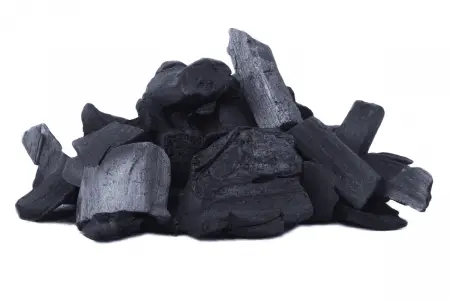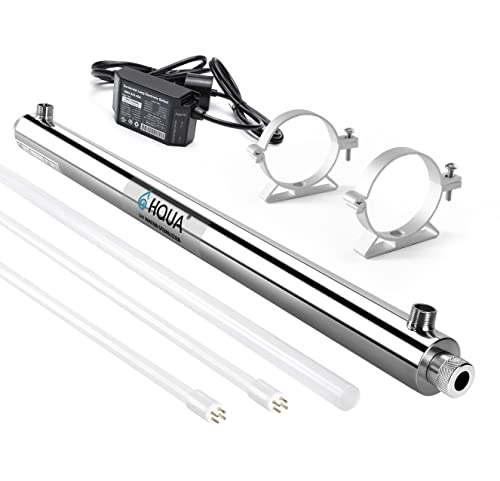There’s a whole new generation of charcoal water filters claiming to free your drinking water from toxins. But the question is: “are charcoal filters safe?”
And could we be doing more harm than good by using charcoal filters to clean our water?
In this article, we’ll look into possible charcoal water filter side effects. We’ll also address some of the safety concerns that come with using carbon filters.
Can Charcoal Water Filters Make You Sick?
In general, no they will not make you sick. However, there is one issue.
They may not be filtering things that can make you sick and you will have a false sense of security. It all depends on the quality of the water and what needs to be filtered out.
Now before you decide whether this form of water is right for you, here are some of the health side effects you need to be aware of:
Check it Out!
Is drinking reverse osmosis water safe? Read all the details in this article!
Charcoal Filtration Doesn’t Remove Bacteria
First things first, activated carbon filters are somewhat limited to what they can remove from the water, and if anything, they don’t remove all the nitrates, bacteria, viruses, and dissolved minerals.
Unlike metals, these components pass through the filters because they’re not bound to the carbon.
That said, the filtered water isn’t necessarily hazardous, and in most cases, the tap water you drink is usually treated to remove bacteria and other organisms, and so, it’s not always a big deal when this stuff slips through.
If you have tested your water and see that you have bacteria like coliform, then you need to use the right kind of filter.
Check It Out!
If you have bacteria then check out this list of the best filters for coliform bacteria to make your water safe to drink!
Possible Tooth Decay
Some types of charcoal filters use ion exchange to filter out more contaminants. One of the things it is very good at removing is fluoride.
Some people want the fluoride out of their water but most don’t. If you don’t know that you’re removing the fluoride then there is an increase in risk of tooth decay. You will have to make sure you use a toothpaste high in fluoride to make up the difference. Or, stick with simple charcoal water filters that don’t use ion exchange.
Bacterial Growth
As we had mentioned earlier, unmaintained filters have a detrimental impact on water quality and your health as well.
See, an old filter is not only going to be less effective and slow, but really gross and grimy.
When you don’t replace your filters as required, the filter media might grow mold and impart material such as microbes and bacteria in your water.
So, yes, a charcoal filter can actually add more bacteria in your water.
This condition is even made worse in the moist environment of the pitcher since it offers the perfect condition for bacteria multiplication, and this can make you sick if you continue using the old filter.
In any case, a German Study found out that the number of bacteria on tap water was significantly less than the amounts in filtered water after several weeks of use. By the end of the study, researchers concluded that the filter media had a biofilm growing on it. In some cases, the bacteria colony was up to 10,000 times more than those in the tap water.
But can bacteria in tap water make me sick?
In most cases, bacteria in tap water won’t make you sick, but it depends on the type of bacteria. If you have coliform or e coli, and your water supply only has it in small amounts, then the charcoal filter may grow the bacteria to unsafe levels.
It pays to test your water for coliform before you start using a filter anyway.
The Perfect Solution
The best way to avoid any possible contamination or bacteria growth with a charcoal filter is to use a powered filter dispenser. I highly recommend the Aquasana Clean Water Machine for its effectiveness, price and convenience.
Check out a detailed comparison between Aquasana and Berkey gravity filters for your countertop to see which one is best for your needs!
Using a patented Claryum system, it keeps water off of the filter by using power to process and purify the water. The power forces the water through the carbon filter much faster and leaves it less likely to have bacteria growing on it.
In addition to all of that, it is super versatile as it can be used as a countertop water dispenser or as a pitcher that you can put into the fridge. It is very slim and takes up far less space than most countertop systems. Plus, it is NSF certified so it is guaranteed to filter far more than Brita or other charcoal water filter pitchers.
Can Brita filters make you sick? Read this article to find out.
Below you can see the system and just click the link to see more information about it.
- Powered Active Filtration - obsessively engineered to force unfiltered...
- Reduces 96% of 77 harmful contaminants including lead, mercury, asbestos,...
- Full system NSF Certified to standards 42, 53, and 401 +P473 and BPA free -...
- Hydration on demand - instant access to healthy water available at the...
- Longest lasting filter - 8x the capacity of the leading gravity based...
Charcoal Water Filter Side Effects
Generally speaking, it’s quite rare to experience side effects from water derived from charcoal filters. This is because charcoal filters produce some of the cleanest mineral-rich water you can ever get.
However, the main side effects of using a charcoal filter will come from what it does NOT remove. Charcoal filters do not remove arsenic, lead, flouride and total dissolved solids (TDS).
That said, let’s look at some of the more common charcoal water filter side effects.
Charcoal Filtered Water Taste
There is no distinct taste from using a charcoal filter. Only when you don’t use one.
Without a filter, most water from the city has a distinct chlorine taste and smell.
Normally, water from the tap is chlorinated to kill germs. Unfortunately, a “residual” amount of this substance remains in the water.
Now, if left in large quantities, chlorine can be irritating and usually leaves a metallic taste in the mouth.
Check It Out!
If you have city water and don’t like the smell or taste of chlorine then check out this article about chlorine side effects and how to deal with it.
The good news is, the residual chlorine is safe for consumption. Even though there are some side effects, a majority of the users only have an issue with the taste.
Also, it is easier to clear this taste by use of activated carbon water filters that easily draw chlorine from the water.
And while these filter will work fine, you could just let the water lie in the fridge for 12-24 hours, and with time, the chlorine gas will evaporate.
If you have a well, then you may have odors or tastes from the minerals or other matter that the filter can remove.
Carbon Filters Can Harbor Bacteria
A recent study has found that carbon filters can harbor bacteria if they’re not replaced often. (Source)
With time, the surface area of the charcoal filter media becomes filled, thus preventing further adsorption of contaminants. Or, in the case of mechanical filtration, the filter media becomes so clogged with debris preventing the effective free flow of water.
While the latter is easier to spot, since the rate of water generated slows down dramatically, it’s not easy to tell when the surface of the filter media becomes full and needs replacement.
Either way, leaving your media filter exposed could be a recipe for bacterial growth, and so, you need to replace your charcoal filters frequently.
You’ll need a specific carbon filter to get rid of bacteria. Here are some filters we recommend to best to get rid of your bacteria.
Contaminated Replacement Charcoal
Unlike municipal water, personal filters are usually not subject to any government oversight or regulation, save for NSF International that provides certification and standards.
The lack of any governing body and high consumerism on charcoal filters has led to the abundance of sub-standard charcoal filters in the market.
In case you inadvertently purchase an inferior quality or non-certified replacement cartridge, the results will be sub-standard. It might even introduce impurities in your drinking water.
Case in point, if the carbon replacement material was not tested for material safety, it can introduce impurities from the materials in the manufacturing process.
What Do Charcoal Filters Remove?
Carbon filters are quite effective at removing and reducing hundreds of chemicals and contaminants.
Studies by the EPA and NFS claim that charcoal filtration is effective at removing between 60-80 chemicals. Some of these include chlorine, radon, benzene, solvents such as trihalomethane, and volatile organic compounds such as herbicides and pesticides.
In addition to these harmful components, filters similarly remove the bad taste and odor from the water.
That said, the effectiveness of the purification process is dependent on several factors including the type of carbon used and form of carbon use (GAC or carbon block)
Benefits of Charcoal Water Filters
Here are some of the numerous benefits of using charcoal water filters.
Doesn’t Remove the “Good Stuff”
Unlike other water filtration systems, charcoal water filters do not remove some of the essential minerals and ions that are healthy for our bodies.
The chemical composition and structure of the activated charcoal attracts and absorbs the unhealthy organic compounds, while allowing the healthy minerals to pass and remain in the water.
Unfortunately, this process doesn’t remove all the pathogens and micro-organisms, and it’s for this reason that a charcoal filter is used in conjunction with other water filtration methods.
It Makes Water Healthy
As we had mentioned earlier, the charcoal water filter removes plenty of nasty stuff for the water, including the chemicals and compounds.
Even better, activated charcoal can add essential elements such as calcium, iron, and magnesium back into your water, thus improving the overall water quality.
Improves Flavor
Even though the addition of chlorine is necessary to prevent the propagation of bacteria, it usually leaves a metallic taste in the mouth.
A charcoal filter, however, not only absorbs the nasty smell, but they’re equally effective and removing the odors, hence making the water more palatable.
Cost Effective
A charcoal water filter is relatively inexpensive to produce, and unlike other filtration systems, they’re not costly to run.
Easy Maintenance
Sure, the media filters require constant replacement once the charcoal is used, but the good thing is that replacement parts are relatively cheap and easy to install.
Typically, your water media filter should be replaced every six months, but if you’re unsure, look at the clarity of the water and see whether it has changed. Also, you can observe to see whether the taste has changed or whether the flow rate has decreased.
Can You Reactivate Activated Carbon?
Unfortunately, all good things come to an end, and with time, the activated carbon eventually stops working.
There will be a time when your filter is no longer active, and you may want to reactivate it. Unfortunately, it is not possible to do this yourself at home.
It requires subjecting carbon to temperatures of up to 900 degrees Celsius.
Beyond the heat requirements, there’s also the safety aspect. When the carbon is reactivated, it releases all the adsorbed impurities into the air in the form of vapor. The vaporized impurities are toxic. To prevent the release of these gases into the atmosphere, this process should be handled in an inert gas chamber.
FAQ About Charcoal Water Filters
Absolutely not. After all, they naturally occur on Earth, and if anything, they do not release any harmful elements.
Generally speaking, activated carbon lasts anywhere from 4 to 6 months, though the need for replacement will depend on the frequency of usage, the amount you filter, and the level of contamination of the water.
No, activated carbon does not remove algae, but it can reduce elements that are known to induce the formation of algae such as phosphates.
No. In most cases, carbon water allows the sip-through of all bacteria, including the beneficial types.
Charcoal filters have not been found to remove fluoride completely.
Conclusion
Should I use charcoal or carbon water filters?
In my opinion, carbon water filters are quite effective at removing the hazardous elements form our tap water. Charcoal water filters are as safe as they are effective.
Sure, they don’t get rid of all the elements, and some users claim to experience side effects. But the charcoal water filter side effects are non-harmful, and instances of irritation are few and far between.
The most crucial thing, however, is to ensure that you frequently replace your carbon filters because it is the most prevalent cause of side effects.

I graduated with a degree in Chemical Engineering and have written for a number of nationally recognized publications in the home improvement space. My skills include fluid mechanics and process engineering and I have worked on numerous projects, including in waste water flow rate calculation and heat balance of steam rollers in the paper industry. My goal as a technical writer is to make complicated topics easy to understand for the average person.





